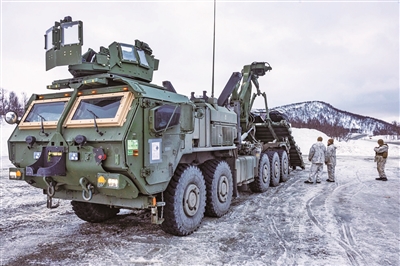
Members of the US Marine Corps participating in NATO's Nordic Response exercise unload snowmobiles on March 7, 2024.
近期,随着欧洲局部冲突延续和大国博弈升级,美国正借势强化对北欧各国的战略捆绑,恶化地区安全环境。
As local conflicts in Europe persist and great power competition intensifies, the US is capitalizing on this opportunity to enhance its strategic ties with Nordic countries, which exacerbates the regional security environment.
北欧转向整体“北约化”
Northern Europe moves towards NATO integration
俄乌冲突爆发后,在西方总体与俄对立大环境下,芬兰、瑞典的中立立场开始转变,并于2022年5月申请加入北约。
After the outbreak of the Russia-Ukraine conflict, Finland and Sweden began to reconsider their neutral position within the broader context of the confrontation between the West and Russia, and in May 2022, they both applied for NATO membership.
在两国的入约的过程中,美国是支持力度最大、调门最高的北约国家。2022年8月,美国正式签署批准两国入约的议定书,并以拒售F-16战机为筹码,向对瑞典入约设置障碍的土耳其施压。在美国主导下,北约与北欧两国军事合作全面加强,两年来接连举行“北极边缘”“寒冷反应”“北极挑战”等多场多边联合军演。
The US was the most supportive and active NATO member during their accession process. In August 2022, the US officially signed a protocol ratifying the entry of the two countries into the organization, and used the refusal to sell F-16 fighters as leverage to pressure Türkiye, which was obstructing Sweden's entry into NATO. Under the leadership of the US, military cooperation between NATO and the two Nordic countries has been significantly strengthened. Over the past two years, multiple multilateral joint military exercises like "Arctic Edge", "Cold Response", and "Arctic Challenge" have been held consecutively.
2023年4月,芬兰正式加入北约。2023年底,美国接连与瑞典、芬兰、丹麦签署防务协议,3国宣布向美国开放多达35处军事设施,美军可不受阻碍地开展人员部署、训练演习、物资转运等军事行动。加之美国与挪威、冰岛此前已签署类似防务协议,美军前出北极地区将更为便捷。
In April 2023, Finland officially joined NATO. By the end of the same year, the US successively signed defense agreements with Sweden, Finland, and Denmark. The three countries announced that they would open up to 35 military facilities to the US, allowing unrestricted military operations such as personnel deployment, training exercises, and material transfer. Furthermore, the US had also signed similar defense agreements with Norway and Iceland, making it easier for US troops to operate in the Arctic.
北极地区误陷“阵营化”
The Arctic region strays into camp confrontation
随着北约“收官”北扩进程,北极乃至欧洲地区的地缘版图和安全格局再次被改绘。
With NATO's ending of northward expansion, the geopolitical map and security landscape in the Arctic and even Europe have been once again reshaped.
美国已如愿将多边军事同盟引入北欧。新入约的瑞典和芬兰均为欧洲中等强国,军力规模依次为第36位和第50位,国防工业也自成体系。北约吸纳北欧两国,意义不止于扩大阵容,而是更利于美国在北极博弈中构建复合型同盟网络、打造排他性合作机制“小圈子”。
The US has successfully introduced multilateral military alliances into Northern Europe. Sweden and Finland, the newly joined countries, are both middle-sized European powers, with the 36th and 50th largest military forces, respectively. Their defense industries are also self-contained. The inclusion of the two countries in NATO not only expands NATO, but also makes it easier for the US to establish a comprehensive alliance network and create an exclusive clique in the Arctic game.
北极地区军事安全管控机制已步入危险的“空窗期”。俄罗斯是地理意义上最大的北极国家,在北极地区拥有诸多军事基础设施,极地装备研发也走在前列,是北极治理不可或缺的一方。随着长期中立的北欧两国“投奔”北约,8个环北极国家已呈现“北约7国与俄对峙”局面,再无任何北极域内国家可“居间调停”,北极地区发生冲突的风险大增。
The military security control mechanism in the Arctic has entered a dangerous “window of vulnerability”. As the largest Arctic country in terms of geography, Russia possesses numerous military infrastructures in the Arctic region and leads in polar equipment research and development. It is an indispensable party in Arctic governance. With the two Nordic countries, traditionally neutral, "swinging" to NATO, the eight Arctic rim countries have presented a situation in which "NATO's seven countries confront Russia". No country within the Arctic region can mediate any longer, and the risk of conflicts in the Arctic region has significantly increased.
北极博弈加速白热化
The Arctic power struggle is intensifying
北极的重要战略地位体现在多个方面:大国彼此实施军事打击的最短路径;随着全球变暖和海冰融化、可通行时间越来越长的洲际航道;正从冰面下纷纷现身示形的丰富自然资源;潜力不菲的旅游产业;全球生态环境保护的要地……
The essential strategic position of the Arctic is reflected in several aspects, including the shortest route for major powers to launch military attacks against each other, intercontinental shipping routes with increasingly extended navigable time due to global warming and melting sea ice, rich natural resources emerging from beneath the icy surface, a tourism industry with great potential, and a significant location for global ecological protection.
以美国为首的北约正急于利用北欧下“先手棋”,以赢得在北极的竞争优势。在北约鼓动下,2023年3月底以来,丹麦、挪威、芬兰、瑞典4国正加紧组建一支规模达250架战机的“联合空军”,并为此预计向美国采购143架F-35战机,未来将成为北约麾下最大的一支常备空中威慑力量。其中,芬兰空军采购的首批美制F-35战机,将于2026年部署至位于北极圈内的罗瓦涅米空军基地,充当北约的“北极前哨”。
The US-led NATO is eager to leverage Northern Europe to gain the first-mover advantage in the Arctic. Encouraged by NATO, Denmark, Norway, Finland, and Sweden have been intensifying their efforts to establish a "joint air force" consisting of 250 fighters since the end of March 2023. For this purpose, they are expected to purchase 143 F-35 fighters from the US, which will become the largest standby deterrent air power under NATO. Among them, the initial batch of F-35 fighters procured by the Finnish Air Force will be deployed to the Rovaniemi Air Base in the Arctic Circle in 2026, serving as NATO's "Arctic Outpost".
北欧国家对北约“一边倒”,加深了地区安全困境。鉴于俄核心城市和人口密集区的西北方向威胁加剧,2月26日,俄总统普京签署命令,重建莫斯科军区和列宁格勒军区。俄防长绍伊古称,这项调整旨在回应北约在俄边境周围加强军事能力并不断扩员的行为。北欧国家未来或将被北约顶在一线,充当对抗俄罗斯、争夺北极控制权的角色,是否还能像以前那样在国际变局中独善其身,实难预料。
The Nordic countries' inclination towards NATO has intensified the regional security dilemma. In light of the growing threat to the northwest of Russia's major cities and densely populated areas, Russian President Vladimir Putin signed an order on February 26 to rebuild the Moscow and Leningrad Military Districts. Russian Defense Minister Sergei Shoigu stated that this adjustment aims to respond to NATO's increasing military capabilities and expansion along the Russian border. It is difficult to predict whether the Nordic countries, which may be pushed by NATO to fight against Russia in the future in a bid to control the Arctic, will remain immune to international changes as they have been before.
当今世界处于新的动荡变革期,北极议题“安全化”乃至“泛安全化”,与国际社会一贯倡导、北欧国家也曾备加推崇的北极合作精神背道而驰,将加剧各方安全焦虑,给本已困难重重的全球公域治理带来消极影响。
The world today is in a new era of turbulence and change. The "securitization" or even "pan-securitization" of the Arctic agenda contradicts the longstanding spirit of Arctic cooperation advocated by the international community and highly respected by Nordic countries. This will intensify security anxiety among all parties and bring negative impacts to the already challenging governance of the global commons.













